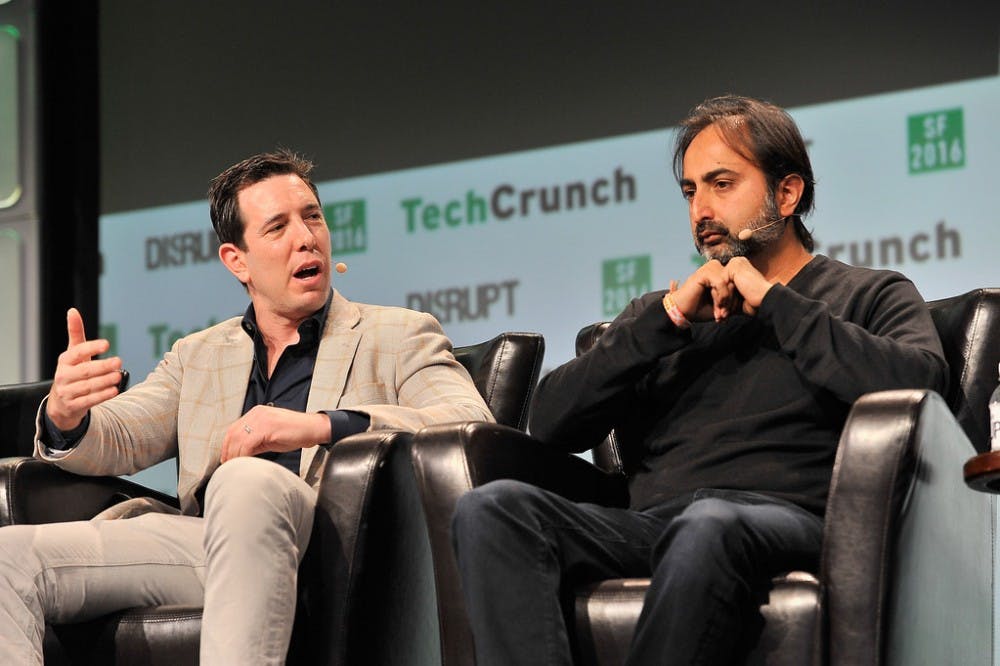
Bradley Tusk (left) aims to add a technological revelation to voting. (Photo contributed by Steve Jennings CC BY 2.0)
The idea of securely voting on phones may seem like a fantasy, but for 1994 College graduate and entrepreneur Bradley Tusk, it could soon be a reality.
The New York businessman, philanthropist, and former political staffer believes phones are critical to improving the relatively low voter turnout in the United States.
“If people can vote in every election on their phone over blockchain, turnout will be exponentially higher,” Tusk said. “The same people who never vote in primaries were willing to advocate politically if they could do it from their phones.”
Blockchain, a decentralized form of recording financial transactions, has made headlines in recent years for enabling the creation of Bitcoin and other cryptocurrencies, and for being difficult to hack or sabotage.
Through his charity Tusk Philanthropies, Tusk has funded mobile voting initiatives in states such as West Virginia and Colorado. The initiatives, so far, have largely been focused on helping overseas military personnel vote via their phones.
Tusk said this increase in voter turnout would reduce polarization, especially in primary elections.
“The reason we have so much dysfunction and polarization right now is so few people actually vote,” Tusk said. “Politicians respond rationally to whoever the political inputs are.”
Tusk explained how a Republican politician who might support certain gun restrictions could be deterred by low primary turnout.
“Turnout in your primary is 12 percent. You may know an assault weapons ban is a good idea, but if that 12 percent is National Rifle Association members, you’re never going to vote for it” Tusk said. "Go to a world where turnout is 60 percent in your primary, the polling flips completely and you'd be crazy not to be for it."
While his current focus is on promoting mobile voting, Tusk got his start in politics as an undergraduate, working in former Pennsylvania Governor Ed Rendell’s administration to entice non-profit organizations such as Penn to pay the city.
“We came up with a whole program on how do that, how to get people to voluntarily work with the city,” Tusk said.
Under an agreement between Philadelphia and Penn, the University paid the city almost $2 million annually from 1995 to 2000 under Rendell's administration.
After serving as the communications director for New York Senator Chuck Schumer’ and the campaign manager for former Mayor Michael Bloomberg in 2009, Tusk accepted an offer from Uber to help lobby against New York City regulations.
“The taxis have lots of lobbyists and campaign contributions and all the usual stuff political insiders have,” Tusk said. “The thing that we did that was unique and successful is that we mobilized our customers to fight on our behalf.”
Tusk discussed his involvement in politics and pitched his idea of mobile voting at an event hosted by Penn Dems on April 30.
Penn Dems secretary and College sophomore Francois Barrilleaux said he was initially skeptical of mobile voting before Tusk's talk.
“[Tusk’s] charisma and explanation did convince me that mobile voting is an area that could use more research and testing.”
Despite Tusk’s pitch, some students remained skeptical of mobile voting. Barrilleaux said the complexity of running an election could result in potential problems when implementing mobile voting.
“While voting might seem simple, the process for inputting, recording, and tabulating votes is very complex and has numerous vulnerabilities,” Barrilleaux said. “We have to be careful that we aren't taking away people's voice through faulty systems that can be hacked or tampered with.”
The Daily Pennsylvanian is an independent, student-run newspaper. Please consider making a donation to support the coverage that shapes the University. Your generosity ensures a future of strong journalism at Penn.
Donate







